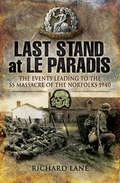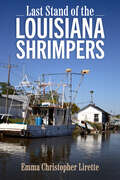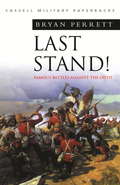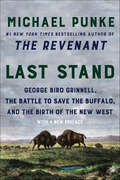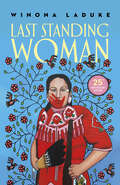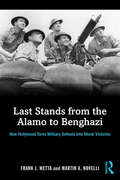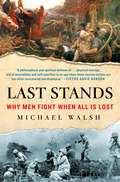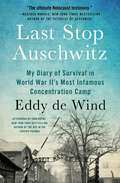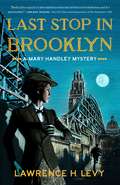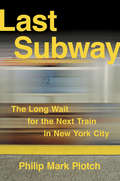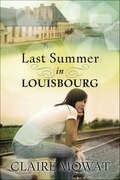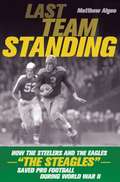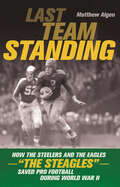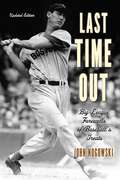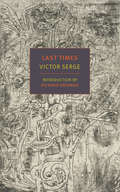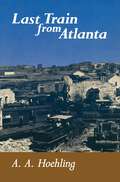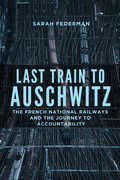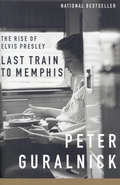- Table View
- List View
Last Stand at le Paradis: The Events Leading to the SS Massacre of the Norfolks 1940
by Richard LaneIn early September 1939, the 2nd Battalion Royal Norfolk Regiment were one of the first complete infantry units of the BEF to land in France.The first months of World War Two were relatively quiet but after deploying to the Maginot Line sector during January 1940 they came into contact with those Germans manning the West Wall or Siegfried Line. A patrol led by Captain Peter Barclay entered German territory and was attacked. As a result, the first decorations of the war were awarded. Barclay received the Military Cross and Lance-Corporal Davis the Military Medal while the remaining members of the patrol were mentioned in despatches.Two days later, the battalion suffered a tragic first when Lieutenant Patrick Everitt was mortally wounded while leading a daylight patrol. Everitt was the first British officer to be killed in action in the Second World War.When the Germans launched their offensive on 10 May, the BEF advanced to the River Dyle in Belgium. Within days the Allied Armies had been forced onto the back foot by the speed and ferocity of the German breakthrough. The Norfolks withdrew to the River Escaut where the BEF was to make a stand. On 21 May, the Company Sergeant Major George Gristock courageously destroyed some German machine-gun posts and won a posthumous Victoria Cross.As the Allies withdrew towards the Channel, the Norfolks were ordered to defend a section of the Canal Line between Bthune and Le Cornet Malo. Already down to around half strength, the Norfolks held their sector from 24 to 27 May. By the time the order was issued for them to withdraw, it was too late, Battalion HQ at Duries Farm, Le Paradis was surrounded and they had no alternative but to surrender, although C Company held out until the following morning.After the surrender, ninety-nine men of the Battalion were marched to a paddock where they were machine-gunned in cold blood by their SS captors. Miraculously, two men survived and were instrumental in bringing the SS officer responsible, Fritz Knoechlien, to justice after the war.When the remnants of the battalion reassembled in England, its strength was just five officers and 134 other ranks. The remainder had either been killed or captured as POWs.
Last Stand of the Louisiana Shrimpers
by Emma Christopher LiretteIn recent years, shrimpers on the Louisiana coast have faced a historically dire shrimp season, with the price of shrimp barely high enough to justify trawling. Yet, many of them wouldn’t consider leaving shrimping behind, despite having transferrable skills that could land them jobs in the oil and gas industry. Since 2001, shrimpers have faced increasing challenges to their trade: an influx of shrimp from southeast Asia, several traumatic hurricane seasons, and the largest oil spill at sea in American history. In Last Stand of the Louisiana Shrimpers, author Emma Christopher Lirette traces how Louisiana Gulf Coast shrimpers negotiate land and blood, sea and freedom, and economic security and networks of control. This book explores what ties shrimpers to their boats and nets. Despite feeling trapped by finances and circumstances, they have created a world in which they have agency. Lirette provides a richly textured view of the shrimpers of Terrebonne Parish, Louisiana, calling upon ethnographic fieldwork, archival research, interdisciplinary scholarship, and critical theory. With evocative, lyrical prose, she argues that in persisting to trawl in places that increasingly restrict their way of life, shrimpers build fragile, quietly defiant worlds, adapting to a constantly changing environment. In these flickering worlds, shrimpers reimagine what it means to work and what it means to make a living.
Last Stand: Famous Battles Against The Odds (Cassell Military Classics Ser.)
by Bryan PerrettWhat do soldiers do when all is lost?They keep fighting! In this best-selling anthology, Bryan Perrett provides gripping accounts of close-quarter battles and hard fought victory against all the odds. His journey from Napoleonic Europe through to the Korean War highlights thirteen episodes of incredible bravery and sacrifice in unbelievable actions. The book begins with the gallant fight of Napoleon's Old Guard at Waterloo. It examines the famous actions at the Alamo; against the Zulus at Rorke's Drift; and 'the Bridge Too Far' at Arnhem. The adventure concludes with the desperate last stand of the Gloucesters at Imjin during the Korean War. Last Stand! is the breathtaking story of ultimate sacrifice and glorious victory.
Last Stand: Famous Battles Against The Odds (W&N Military)
by Bryan PerrettWhat do soldiers do when all is lost?They keep fighting! In this best-selling anthology, Bryan Perrett provides gripping accounts of close-quarter battles and hard fought victory against all the odds. His journey from Napoleonic Europe through to the Korean War highlights thirteen episodes of incredible bravery and sacrifice in unbelievable actions. The book begins with the gallant fight of Napoleon's Old Guard at Waterloo. It examines the famous actions at the Alamo; against the Zulus at Rorke's Drift; and 'the Bridge Too Far' at Arnhem. The adventure concludes with the desperate last stand of the Gloucesters at Imjin during the Korean War. Last Stand! is the breathtaking story of ultimate sacrifice and glorious victory.
Last Stand: George Bird Grinnell, the Battle to Save the Buffalo, and the Birth of the New West
by Michael PunkeThe dramatic history of the extermination and resurrection of the American buffalo, by #1 bestselling author of The Revenant Michael Punke's The Last Stand tells the epic story of the American West through the lens of the American bison and the man who saved these icons of the Western landscape.Over the last three decades of the nineteenth century, an American buffalo herd once numbering 30 million animals was reduced to twelve. It was the era of Manifest Destiny, a Gilded Age that treated the West as nothing more than a treasure chest of resources to be dug up or shot down. The buffalo in this world was a commodity, hounded by legions of swashbucklers and unemployed veterans seeking to make their fortunes. Supporting these hide hunters, even buying their ammunition, was the U.S. Army, which considered the eradication of the buffalo essential to victory in its ongoing war on Native Americans.Into that maelstrom rode young George Bird Grinnell. A scientist and a journalist, a hunter and a conservationist, Grinnell would lead the battle to save the buffalo from extinction. Fighting in the pages of magazines, in Washington's halls of power, and in the frozen valleys of Yellowstone, Grinnell and his allies sought to preserve an icon from the grinding appetite of Robber Baron America.Grinnell shared his adventures with some of the greatest and most infamous characters of the American West—from John James Audubon and Buffalo Bill to George Armstrong Custer and Theodore Roosevelt (Grinnell's friend and ally). A strikingly contemporary story, the saga of Grinnell and the buffalo was the first national battle over the environment. Last Stand is the story of the death of the old West and the birth of the new as well as an examination of how the West was really won—through the birth of the conservation movement. It is also the definitive history of the American buffalo, written by a master storyteller of the West.
Last Standing Woman
by Winona LaDukeBorn at the turn of the 21st century, The Storyteller, also known as Ishkwegaabawiikwe (Last Standing Woman), carries her people&’s past within her memories. The White Earth Anishinaabe people have lived on the same land for over a thousand years. Among the towering white pines and rolling hills, the people of each generation are born, live out their lives, and are buried.The arrival of European missionaries changes the community forever. Government policies begin to rob the people of their land, piece by piece. Missionaries and Indian agents work to outlaw ceremonies the Anishinaabeg have practised for centuries. Grave-robbing anthropologists dig up ancestors and whisk them away to museums as artifacts. Logging operations destroy traditional sources of food, pushing the White Earth people to the brink of starvation.Battling addiction, violence, and corruption, each member of White Earth must find their own path of resistance as they struggle to reclaim stewardship of their land, bring their ancestors home, and stay connected to their culture and to each other.In this highly anticipated 25th anniversary edition of her debut novel, Winona LaDuke weaves a nonlinear narrative of struggle and triumph, resistance and resilience, spanning seven generations from the 1800s to the early 2000s.
Last Standing Woman
by Winona LaDukeBorn at the turn of the 21st century, The Storyteller, also known as Ishkwegaabawiikwe (Last Standing Woman), carries her people&’s past within her memories. The White Earth Anishinaabe people have lived on the same land for over a thousand years. Among the towering white pines and rolling hills, the people of each generation are born, live out their lives, and are buried.The arrival of European missionaries changes the community forever. Government policies begin to rob the people of their land, piece by piece. Missionaries and Indian agents work to outlaw ceremonies the Anishinaabeg have practised for centuries. Grave-robbing anthropologists dig up ancestors and whisk them away to museums as artifacts. Logging operations destroy traditional sources of food, pushing the White Earth people to the brink of starvation.Battling addiction, violence, and corruption, each member of White Earth must find their own path of resistance as they struggle to reclaim stewardship of their land, bring their ancestors home, and stay connected to their culture and to each other.In this highly anticipated 25th anniversary edition of her debut novel, Winona LaDuke weaves a nonlinear narrative of struggle and triumph, resistance and resilience, spanning seven generations from the 1800s to the early 2000s.
Last Stands from the Alamo to Benghazi: How Hollywood Turns Military Defeats into Moral Victories
by Frank Wetta Martin NovelliLast Stands from the Alamo to Benghazi examines how filmmakers teach Americans about the country’s military past. Examining twenty-three representative war films and locating them in their cultural and military landscape, the authors argue that Hollywood’s view of American military history has evolved in two phases. The first phase, extending from the very beginnings of filmmaking to the Korean War, projected an essential patriotic triumphalism. The second phase, from the Korean and Vietnam Wars to the present, reflects a retreat from consensus and reflexive patriotism. In describing these phases, the authors address recurring themes such as the experience of war and combat, the image of the American war hero, race, gender, national myths, and more. With helpful film commentaries that extend the discussion through popular movie narratives, this book is essential for anyone interested in American military and film history.
Last Stands: Why Men Fight When All Is Lost
by Michael Walsh"A philosophical and spiritual defense of the premodern world, of the tragic view, of physical courage, and of masculinity and self-sacrifice in an age when those ancient virtues are too often caricatured and dismissed." —Victor Davis Hanson Award-winning author Michael Walsh celebrates the masculine attributes of heroism that forged American civilization and Western culture by exploring historical battles in which soldiers chose death over dishonor in Last Stands: Why Men Fight When All Is Lost.In our contemporary era, men are increasingly denied their heritage as warriors. A survival instinct that’s part of the human condition, the drive to wage war is natural. Without war, the United States would not exist. The technology that has eased manual labor, extended lifespans, and become an integral part of our lives and culture has often evolved from wartime scientific advancements. War is necessary to defend the social and political principles that define the virtues and freedoms of America and other Western nations. We should not be ashamed of the heroes who sacrificed their lives to build a better world. We should be honoring them.The son of a Korean War veteran of the Inchon landing and the battle of the Chosin Reservoir with the U.S. Marine Corps, Michael Walsh knows all about heroism, valor, and the call of duty that requires men to fight for something greater than themselves to protect their families, fellow countrymen, and most of all their fellow soldiers. In Last Stands, Walsh reveals the causes and outcomes of more than a dozen battles in which a small fighting force refused to surrender to a far larger force, often dying to the last man.From the Spartans’ defiance at Thermopylae and Roland’s epic defense of Charlemagne’s rear guard at Ronceveaux Pass, through Santa Anna’s siege of the Alamo defended by Davy Crockett and Jim Bowie to the skirmish at Little Big Horn between Crazy Horse’s Sioux nation and George Armstrong Custer’s Seventh Calvary, to the Soviets’ titanic struggle against the German Wehrmacht at Stalingrad, and more, Walsh reminds us all of the debt we owe to heroes willing to risk their lives against overwhelming odds—and how these sacrifices and battles are not only a part of military history but our common civilizational heritage.
Last Stop Auschwitz: My Story of Survival from within the Camp
by Eliazar de WindWritten in Auschwitz itself, this one-of-a-kind, minute-by-minute true account is a crucial historical testament to a Holocaust survivor's fight for his life at the largest extermination camp in Nazi Germany, translated for the first time ever into English. "We know that there is only one ending to this, only one liberation from this barbed wire hell: death." --Eddy de WindIn 1943, amidst the start of German occupation, Eddy de Wind worked as a doctor at Westerbork, a Dutch transit camp. His mother had been taken to this camp by Nazis but Eddy was assured by the Jewish Council she would be freed in exchange for his labor. He later found out she'd already been transferred to Auschwitz. While at Westerbork, he fell in love with a woman named Friedel and they married. One year later, they were transported to Auschwitz. Upon arrival, Friedel and Eddy were separated--Eddy forced to work as a medical assistant in one barrack, Friedel at the mercy of Nazi experimentation in a nearby block. Sneaking moments with his beloved and communicating whenever they could, Eddy longed for the day he could be free with Friedel...Written in the camp itself in the weeks following the Red Army's liberation of the camp, Last Stop Auschwitz is the raw, true account of Eddy's experiences at Auschwitz. In stunningly poetic prose, he provides unparalleled access to the horrors he faced in the concentration camp. Including photos from Eddy's life before, during, and after the Holocaust, this poignant memoir is at once a moving love story, a detailed portrayal of the atrocities of Auschwitz, and an intelligent consideration of the kind of behavior-both good and evil-people are capable of. Never before published in English, this book is a vital and enduring document: a testament to the strength of the human spirit, and a warning against the depths we can sink to when prejudice is given power
Last Stop Union Station: A Novel
by Sarah JamesMurder, movie stars, and mystery await those who climb aboard this cross-country train, inspired by the real-life history of the Hollywood Victory CaravanHollywood, 1942. Jacqueline Love's acting career is flailing. Suddenly on the wrong side of 40, parts are drying up, directors are calling her "difficult," and Humphrey Bogart has definitely stopped taking her calls. Desperate to cling to stardom, Jackie takes the only gig that will have her: the Hollywood Victory Caravan, a train full of movie stars crossing the country to fundraise for the war effort. Jackie wouldn't call herself patriotic, but with her life's work on the line, she'll do anything.When a fellow star dies on board, everyone assumes the death was a tragic accident–but Jackie isn't so sure. Stuck in Chicago's Union Station, Jackie enlists the help of Grace, one of the few women in the police force, to investigate. But "difficult" outside of a movie set is dangerous, and when the pair fall into a homegrown Nazi scheme, Jackie must ask herself what's more important: her career, or her country?
Last Stop Vienna: A Novel
by Andrew NagorskiGermany in the 1920s, in the early days of Hitler and the Nazi party, was a country plunging into darkness and violence. Andrew Nagorski has written the story of a doomed generation, of evil, hopelessness, sexual perversion and murder that set the stage for the ultimate destruction of a society. But in a stunning denouement, a young Nazi brownshirt, acting out of passion and revenge, changes the course of history.Karl Naumann, a German teenager who has lost his father and brother in World War I, has tried to find a place in a defeated, demoralized and anarchic Berlin. Impressed by the returning veterans who refuse to lay down their arms and fight running battles with communist revolutionaries, and alone and adrift on the streets, he is recruited to their cause and camaraderie. He is sent to Munich, where he works his way up the ranks to become one of Adolf Hitler's bodyguards, a storm trooper. The new movement is increasingly split between Hitler and rival leaders, including Karl's mentor, Otto Strasser, a real-life Nazi activist. As the schism within the party widens, the battles intensify and Hitler asserts his dominance, Karl must determine where his loyalty lies. He has fallen in love with a nurse, Sabine, whom he marries, but he is infatuated with Hitler's young niece, Geli Raubal, who is caught up in a deeply disturbing sexual relationship with her uncle. Obsessed by the seductive and elusive Geli, Karl is startled by what he sees through her of the dark core of Hitler's personality. When Geli finally summons up the courage to leave her uncle, it is too late. Soon after, she is found dead in their apartment, a gun in her hand, allegedly a suicide. Karl believes that Hitler has murdered her. He follows him to Geli's grave in Vienna where their final confrontation takes place. Last Stop Vienna presents a chilling and suspenseful look at what might have been.
Last Stop in Brooklyn: A Mary Handley Mystery (Mary Handley #3)
by Lawrence H. LevyIt's the summer of 1894, and an infidelity case has brought PI Mary Handley to a far corner of Brooklyn: Coney Island. In the midst of her investigation, Mary is contacted by a convicted man's brother to reopen a murder case. A prostitute was killed by a Jack the Ripper copycat years ago in her New York hotel room, but her true killer was never found. Once again it's up to Mary to make right the city's wrongs. New York City's untouchable head of detectives, Thomas Byrnes, swears he put the right man behond bars, but as Mary digs deeper, she finds corruption at the heart of New York's justice system, involving not only the police, but the most powerful of stock titans. Disturbing evidence of other murders begins to surface, each one mimicking Jack the Ripper's style, each one covered up by Thomas Byrnes. As Mary pieces together the extent of the damage, she crosses paths with Harper Lloyd, an investigative reporter. Their relationship grows into a partnership, and perhaps more, and together they must catch a killer who's still out there, and reverse the ruthless workings of New York's elite. It'll be Mary's most dangerous, most personal case yet.
Last Subway: The Long Wait for the Next Train in New York City
by Philip Mark PlotchLast Subway is the fascinating and dramatic story behind New York City's struggle to build a new subway line under Second Avenue and improve transit services all across the city. With his extraordinary access to powerful players and internal documents, Philip Mark Plotch reveals why the city's subway system, once the best in the world, is now too often unreliable, overcrowded, and uncomfortable. He explains how a series of uninformed and self-serving elected officials have fostered false expectations about the city's ability to adequately maintain and significantly expand its transit system.Since the 1920s, New Yorkers have been promised a Second Avenue subway. When the first of four planned phases opened on Manhattan's Upper East Side in 2017, subway service improved for tens of thousands of people. Riders have been delighted with the clean, quiet, and spacious new stations. Yet these types of accomplishments will not be repeated unless New Yorkers learn from their century-long struggle.Last Subway offers valuable lessons in how governments can overcome political gridlock and enormous obstacles to build grand projects. However, it is also a cautionary tale for cities. Plotch reveals how false promises, redirected funds and political ambitions have derailed subway improvements. Given the ridiculously high cost of building new subways in New York and their lengthy construction period, the Second Avenue subway (if it is ever completed) will be the last subway built in New York for generations to come.
Last Summer in Louisbourg
by Clare MowatFifteen-year-old Andrea Baxter is thrilled when she is offered a summer job on Cape Breton Island. Although her mother worries that Andrea is too young to move so far away, Andrea welcomes the chance to strike out on her own. It seems the perfect opportunity to escape from all the changes that have come into her life with her mother’s recent marriage: a new stepfather, a new school, and a new house in the suburbs, worlds away from all her old friends.At last, her mother’s fears alleviated and her bags packed, Andrea sets out on a journey to the east coast that marks the beginning of her most memorable summer ever. Not only does she play a role in a movie that is being shot at the historical site where she works, but Andrea also makes great new friends, finds romance, and learns a family secret that will change her life forever.
Last Team Standing
by Matthew AlgeoDuring World War II, the national Football League faced a crisis unimaginable today: a shortage of players. By 1943, so many players were in the armed forces that the league was forced to fold one team (the Cleveland Rams) and merge two others: the Pittsburgh Steelers and the Philadelphia Eagles. Thus were the "Steagles” born. The Steagles included military draft rejects, a superstar lured out of retirement, and even a few active-duty servicemen who got leave for the games. Yet, somehow, this motley crew posted a winning record-the first in Eagles’ history and the second in Steelers’ history. A book about football, about life during the war, Last Team Standing is, above all, about those of the Greatest Generation who, against all odds, contributed to America’s war effort in the unlikeliest ways.
Last Team Standing: How the Steelers and the Eagles—"The Steagles"—Saved Pro Football During World War II
by Matthew AlgeoTracing the history of the National Football League during World War II, this book delves into the severe player shortage during the war which led to the merging of the Pittsburgh Steelers and the Philadelphia Eagles, creating the "Steagles." The team's center was deaf in one ear, its wide receiver was blind in one eye (and partially blind in the other), and its halfback had bleeding ulcers. One player was so old he'd never before played football with a helmet. Yet somehow, this group of players--deemed unfit for military service due to age or physical ailment--posted a winning record in the league, to the surprise of players and fans alike. Digging into the history of the war paralleled by the unlikely story of the Steagles franchise, both sports fans and history buffs will learn about the cultural significance of this motley crew of ball players during a trying time in United States history.
Last Things
by Caroline Walker Bynum Paul FreedmanWhen the medievals spoke of "last things" they were sometimes referring to events, such as the millennium or the appearance of the Antichrist, that would come to all of humanity or at the end of time. But they also meant the last things that would come to each individual separately--not just the place, Heaven, Hell, or Purgatory, to which their souls would go but also the accounting, the calling to reckoning, that would come at the end of life. At different periods in the Middle Ages one or the other of these sorts of "last things" tended to be dominant, but both coexisted throughout. In Last Things, Caroline Walker Bynum and Paul Freedman bring together eleven essays that focus on the competing eschatologies of the Middle Ages and on the ways in which they expose different sensibilities, different theories of the human person, and very different understandings of the body, of time, of the end. Exploring such themes as the significance of dying and the afterlife, apocalyptic time, and the eschatological imagination, each essay in the volume enriches our understanding of the eschatological awarenesses of the European Middle Ages.
Last Time Out: Big-League Farewells of Baseball's Greats
by John NogowskiMost sports fans know that Ted Williams ended his major league career with style, swatting a home run in his final at bat. But what about Babe Ruth? Ty Cobb? Joe DiMaggio? Willie Mays? How did some of baseball's greatest players bow out of The Game? Last Time Out answers that question as it examines how the greatest players in baseball history left the game they once ruled. The stories of these men and how they finished their careers, never collected anywhere before now, show another side of the men whose achievements on the field made them legends. After hours and hours of research, through biographies, microfilm, magazines, and memories, award-winning sportswriter John Nogowski culled the stories of the final games of 25 of The Game's greatest athletes-Babe Ruth, Christy Mathewson, Ty Cobb, Jackie Robinson, Dizzy Dean, Satchel Paige, Carlton Fisk, Bob Feller, Joe Morgan, and Carl Yastrzemski are among those featured. This impressive work recounts the circumstances surrounding these final games and puts you in a box seat to witness and sense the moment as these glorious careers ceased, most often with little fanfare. Whether it be Shoeless Joe Jackson, Lou Gehrig, Pete Rose, or Cal Ripken, Jr., Last Time Out beautifully captures in words and photographs the essence of these players' last time in uniform and celebrates the magic of the game these famed players mastered and loved.
Last Times
by Victor SergeA story of displacement and resistance during the early days of the Nazi occupation of France.Last Times, Victor Serge&’s epic novel of the fall of France, is based—like much of his fiction—on firsthand experience. The author was an eyewitness to the last days of Paris in June 1940 and joined the chaotic mass exodus south to the unoccupied zone on foot with nothing but his manuscripts. He found himself trapped in Marseille under the Vichy government, a persecuted, stateless Russian, and participated in the early French Resistance before escaping on the last ship to the Americas in 1941.Exiled in Mexico City, Serge poured his recent experience into a fast-moving, gripping novel aimed at an American audience. The book begins in a near-deserted Paris abandoned by the government, the suburbs already noisy with gunfire. Serge&’s anti-fascist protagonists join the flood of refugees fleeing south on foot, in cars loaded with household goods, on bikes, pushing carts and prams under the strafing Stukas, and finally make their way to wartime Marseille. Last Times offers a vivid eyewitness account of the city&’s criminal underground and no less criminal Vichy authorities, of collaborators and of the growing resistance, of crowds of desperate refugees competing for the last visa and the last berth on the last—hoped-for—ship to the New World.
Last Train From Atlanta (Stackpole Classics)
by A. A. Hoehling&“The last train for the north leaves here tomorrow morning, Our soldiers are scattered along the railroad as hundred miles north, and as soon as that train passes, the work of destruction will commence. The railroad will be completely destroyed and every bridge burned. Then both armies (the armies of the Tennessee and Georgia) will assemble here, and after destroying the city will commence the march. I fear their track will be one of desolation.&” -- Major General Henry Slocum, Federal Commander of the 20th Corps.
Last Train from Liguria
by Christine Dwyer HickeyA sweeping tale of consequences spanning the 1930s to the 1990s, moving between fascist Italy and modern Ireland In 1933, Bella Stuart leaves her quiet London life to move to Italy to tutor the child of a beautiful Jewish heiress and an elderly Italian aristocrat. Living at the family's summer home, Bella's reserve softens as she comes to love her young charge, and find friendship with Maestro Edward, his enigmatic music teacher. But as the decade draws to an end and fascism tightens its grip on Europe, the fact that Alec is Jewish places his life in grave danger. Bella and Edward take the boy on a terrifying train journey out of Italy—one they have no reason to believe any of them will survive.
Last Train to Auschwitz: The French National Railways and the Journey to Accountability
by Sarah FedermanIn the immediate decades after World War II, the French National Railways (SNCF) was celebrated for its acts of wartime heroism. However, recent debates and litigation have revealed the ways the SNCF worked as an accomplice to the Third Reich and was actively complicit in the deportation of 75,000 Jews and other civilians to death camps. Sarah Federman delves into the interconnected roles—perpetrator, victim, and hero—the company took on during the harrowing years of the Holocaust. Grounded in history and case law, Last Train to Auschwitz traces the SNCF’s journey toward accountability in France and the United States, culminating in a multimillion-dollar settlement paid by the French government on behalf of the railways.The poignant and informative testimonies of survivors illuminate the long-term effects of the railroad’s impact on individuals, leading the company to make overdue amends. In a time when corporations are increasingly granted the same rights as people, Federman’s detailed account demonstrates the obligations businesses have to atone for aiding and abetting governments in committing atrocities. This volume highlights the necessity of corporate integrity and will be essential reading for those called to engage in the difficult work of responding to past harms.
Last Train to Auschwitz: The French National Railways and the Journey to Accountability
by Sarah FedermanIn the immediate decades after World War II, the French National Railways (SNCF) was celebrated for its acts of wartime heroism. However, recent debates and litigation have revealed the ways the SNCF worked as an accomplice to the Third Reich and was actively complicit in the deportation of 75,000 Jews and other civilians to death camps. Sarah Federman delves into the interconnected roles—perpetrator, victim, and hero—the company took on during the harrowing years of the Holocaust. Grounded in history and case law, Last Train to Auschwitz traces the SNCF’s journey toward accountability in France and the United States, culminating in a multimillion-dollar settlement paid by the French government on behalf of the railways.The poignant and informative testimonies of survivors illuminate the long-term effects of the railroad’s impact on individuals, leading the company to make overdue amends. In a time when corporations are increasingly granted the same rights as people, Federman’s detailed account demonstrates the obligations businesses have to atone for aiding and abetting governments in committing atrocities. This volume highlights the necessity of corporate integrity and will be essential reading for those called to engage in the difficult work of responding to past harms.
Last Train to Memphis: The Rise of Elvis Presley
by Peter GuralnickWritten with grace, humor, and affection, Last Train to Memphis has been hailed as the definitive biography of Elvis Presley. It is the first to set aside the myths and focus on Elvis' humanity in a way that has yet to be duplicated.A New York Times Notable BookWinner of the Ralph J. Gleason Music Book Award"Elvis steps from the pages. You can feel him breathe. This book cancels out all others." --Bob Dylan From the moment that he first shook up the world in the mid 1950s, Elvis Presley has been one of the most vivid and enduring myths of American culture.Last Train to Memphis: The Rise of Elvis Presley is the first biography to go past that myth and present an Elvis beyond the legend. Based on hundreds of interviews and nearly a decade of research, it traces the evolution not just of the man but of the music and of the culture he left utterly transformed, creating a completely fresh portrait of Elvis and his world.This volume tracks the first twenty-four years of Elvis' life, covering his childhood, the stunning first recordings at Sun Records ("That's All Right," "Mystery Train"), and the early RCA hits ("Heartbreak Hotel," "Hound Dog," "Don't Be Cruel"). These were the years of his improbable self-invention and unprecedented triumphs, when it seemed that everything that Elvis tried succeeded wildly. There was scarcely a cloud in sight through this period until, in 1958, he was drafted into the army and his mother died shortly thereafter. The book closes on that somber and poignant note.Last Train to Memphis takes us deep inside Elvis' life, exploring his lifelong passion for music of every sort (from blues and gospel to Bing Crosby and Mario Lanza), his compelling affection for his family, and his intimate relationships with girlfriends, mentors, band members, professional associates, and friends. It shows us the loneliness, the trustfulness, the voracious appetite for experience, and above all the unshakable, almost mystical faith that Elvis had in himself and his music. Drawing frequently on Elvis' own words and on the recollections of those closest to him, the book offers an emotional, complex portrait of young Elvis Presley with a depth and dimension that for the first time allow his extraordinary accomplishments to ring true.Peter Guralnick has given us a previously unseen world, a rich panoply of people and events that illuminate an achievement, a place, and a time as never revealed before.
